MBA502 Reflective Essay: Analyzing Emotional and Cultural Intelligence
VerifiedAdded on 2023/06/03
|8
|2023
|327
Essay
AI Summary
This essay explores emotional intelligence and cultural diversity through self-reflection and assessments from colleagues. It utilizes the Johari Window to analyze self-awareness, hidden selves, and unknown aspects of personality. The essay discusses the importance of emotional intelligence in leadership, referencing theories by Salovey and Mayer, Goleman, and Bar-On. It identifies strengths such as relationship management and social awareness, and weaknesses like self-awareness, proposing strategies for improvement. The paper emphasizes the development of competencies for functioning in culturally diverse backgrounds, including self-management, social awareness, cultural knowledge, and tolerance. It concludes that emotional intelligence is crucial for successful global interactions and requires continuous development in self and social awareness.
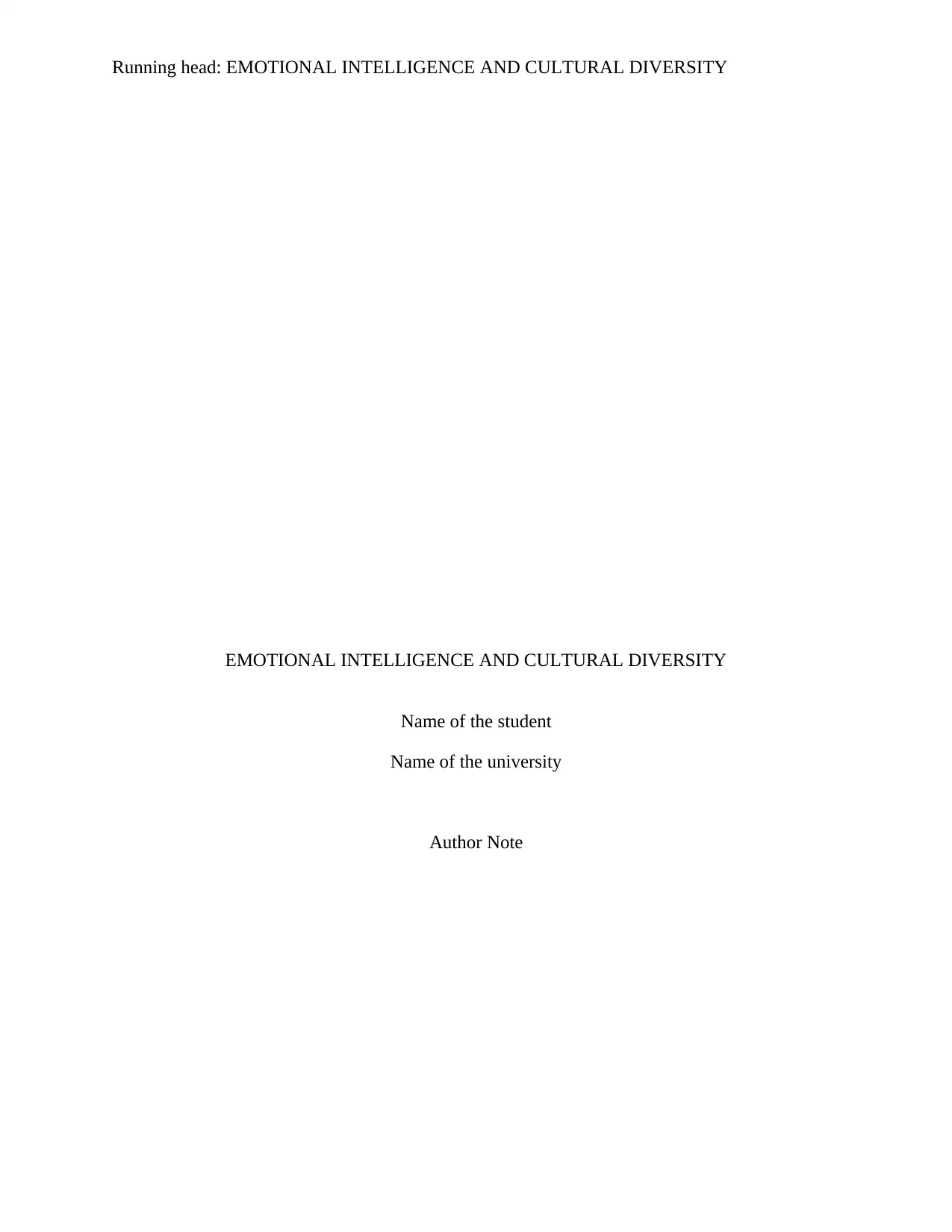
Running head: EMOTIONAL INTELLIGENCE AND CULTURAL DIVERSITY
EMOTIONAL INTELLIGENCE AND CULTURAL DIVERSITY
Name of the student
Name of the university
Author Note
EMOTIONAL INTELLIGENCE AND CULTURAL DIVERSITY
Name of the student
Name of the university
Author Note
Paraphrase This Document
Need a fresh take? Get an instant paraphrase of this document with our AI Paraphraser
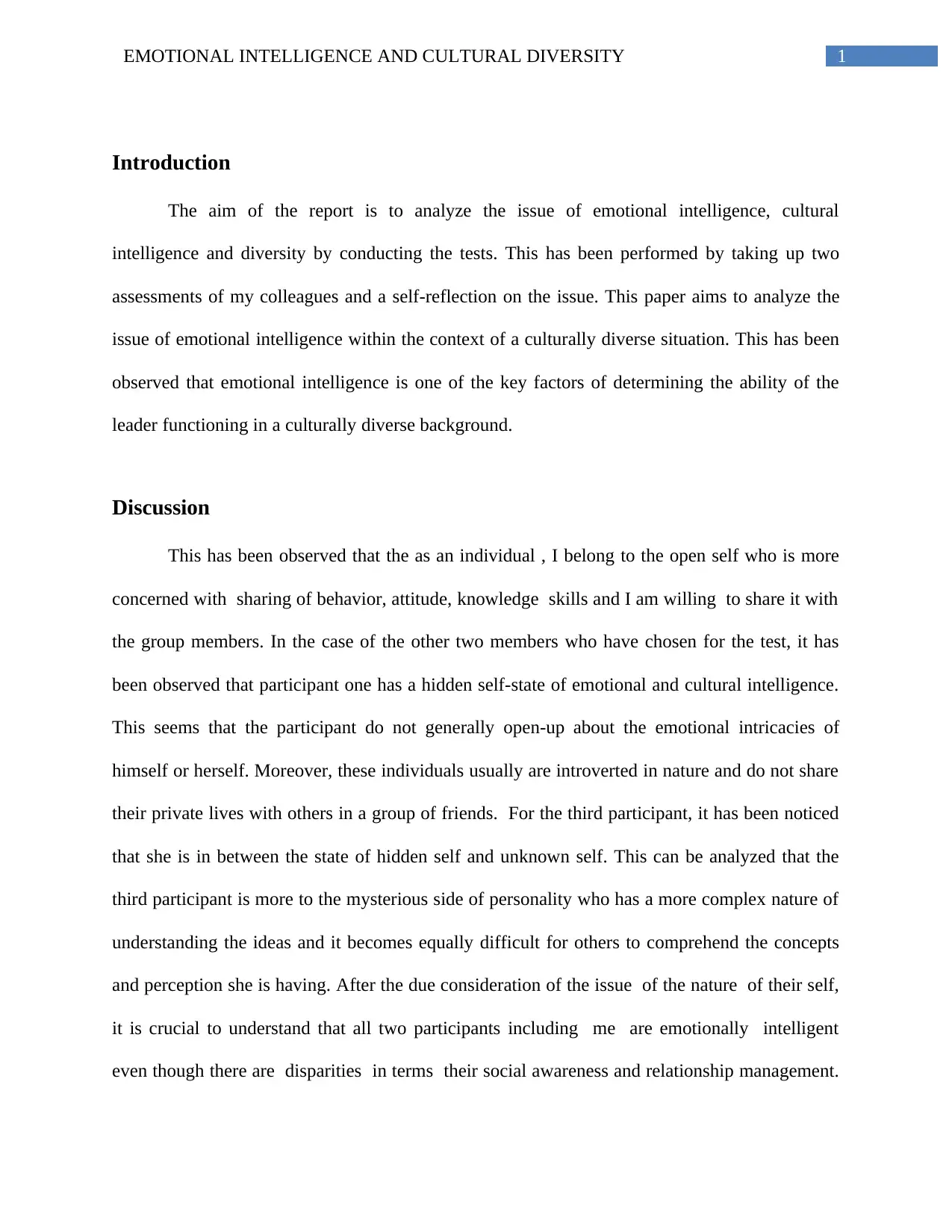
1EMOTIONAL INTELLIGENCE AND CULTURAL DIVERSITY
Introduction
The aim of the report is to analyze the issue of emotional intelligence, cultural
intelligence and diversity by conducting the tests. This has been performed by taking up two
assessments of my colleagues and a self-reflection on the issue. This paper aims to analyze the
issue of emotional intelligence within the context of a culturally diverse situation. This has been
observed that emotional intelligence is one of the key factors of determining the ability of the
leader functioning in a culturally diverse background.
Discussion
This has been observed that the as an individual , I belong to the open self who is more
concerned with sharing of behavior, attitude, knowledge skills and I am willing to share it with
the group members. In the case of the other two members who have chosen for the test, it has
been observed that participant one has a hidden self-state of emotional and cultural intelligence.
This seems that the participant do not generally open-up about the emotional intricacies of
himself or herself. Moreover, these individuals usually are introverted in nature and do not share
their private lives with others in a group of friends. For the third participant, it has been noticed
that she is in between the state of hidden self and unknown self. This can be analyzed that the
third participant is more to the mysterious side of personality who has a more complex nature of
understanding the ideas and it becomes equally difficult for others to comprehend the concepts
and perception she is having. After the due consideration of the issue of the nature of their self,
it is crucial to understand that all two participants including me are emotionally intelligent
even though there are disparities in terms their social awareness and relationship management.
Introduction
The aim of the report is to analyze the issue of emotional intelligence, cultural
intelligence and diversity by conducting the tests. This has been performed by taking up two
assessments of my colleagues and a self-reflection on the issue. This paper aims to analyze the
issue of emotional intelligence within the context of a culturally diverse situation. This has been
observed that emotional intelligence is one of the key factors of determining the ability of the
leader functioning in a culturally diverse background.
Discussion
This has been observed that the as an individual , I belong to the open self who is more
concerned with sharing of behavior, attitude, knowledge skills and I am willing to share it with
the group members. In the case of the other two members who have chosen for the test, it has
been observed that participant one has a hidden self-state of emotional and cultural intelligence.
This seems that the participant do not generally open-up about the emotional intricacies of
himself or herself. Moreover, these individuals usually are introverted in nature and do not share
their private lives with others in a group of friends. For the third participant, it has been noticed
that she is in between the state of hidden self and unknown self. This can be analyzed that the
third participant is more to the mysterious side of personality who has a more complex nature of
understanding the ideas and it becomes equally difficult for others to comprehend the concepts
and perception she is having. After the due consideration of the issue of the nature of their self,
it is crucial to understand that all two participants including me are emotionally intelligent
even though there are disparities in terms their social awareness and relationship management.
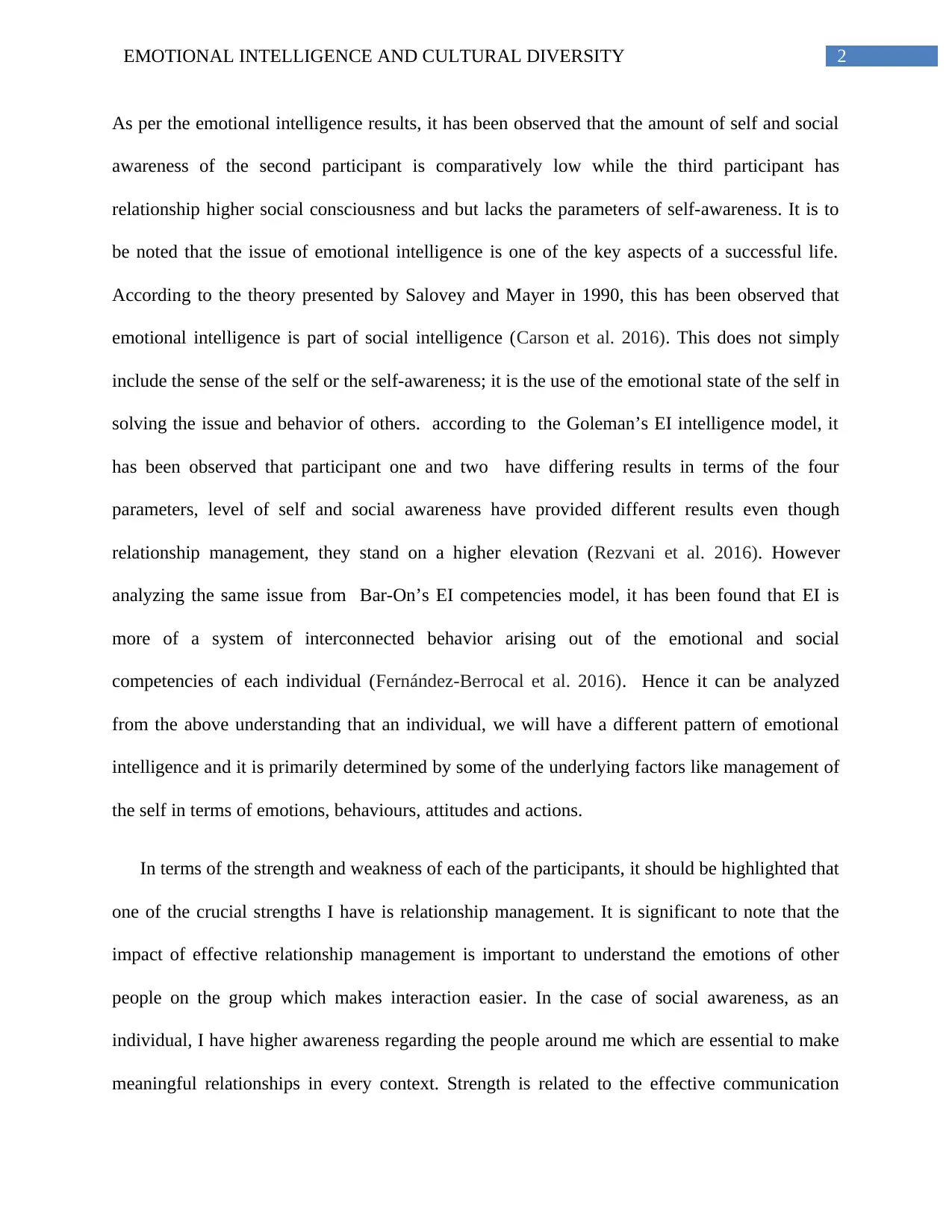
2EMOTIONAL INTELLIGENCE AND CULTURAL DIVERSITY
As per the emotional intelligence results, it has been observed that the amount of self and social
awareness of the second participant is comparatively low while the third participant has
relationship higher social consciousness and but lacks the parameters of self-awareness. It is to
be noted that the issue of emotional intelligence is one of the key aspects of a successful life.
According to the theory presented by Salovey and Mayer in 1990, this has been observed that
emotional intelligence is part of social intelligence (Carson et al. 2016). This does not simply
include the sense of the self or the self-awareness; it is the use of the emotional state of the self in
solving the issue and behavior of others. according to the Goleman’s EI intelligence model, it
has been observed that participant one and two have differing results in terms of the four
parameters, level of self and social awareness have provided different results even though
relationship management, they stand on a higher elevation (Rezvani et al. 2016). However
analyzing the same issue from Bar-On’s EI competencies model, it has been found that EI is
more of a system of interconnected behavior arising out of the emotional and social
competencies of each individual (Fernández-Berrocal et al. 2016). Hence it can be analyzed
from the above understanding that an individual, we will have a different pattern of emotional
intelligence and it is primarily determined by some of the underlying factors like management of
the self in terms of emotions, behaviours, attitudes and actions.
In terms of the strength and weakness of each of the participants, it should be highlighted that
one of the crucial strengths I have is relationship management. It is significant to note that the
impact of effective relationship management is important to understand the emotions of other
people on the group which makes interaction easier. In the case of social awareness, as an
individual, I have higher awareness regarding the people around me which are essential to make
meaningful relationships in every context. Strength is related to the effective communication
As per the emotional intelligence results, it has been observed that the amount of self and social
awareness of the second participant is comparatively low while the third participant has
relationship higher social consciousness and but lacks the parameters of self-awareness. It is to
be noted that the issue of emotional intelligence is one of the key aspects of a successful life.
According to the theory presented by Salovey and Mayer in 1990, this has been observed that
emotional intelligence is part of social intelligence (Carson et al. 2016). This does not simply
include the sense of the self or the self-awareness; it is the use of the emotional state of the self in
solving the issue and behavior of others. according to the Goleman’s EI intelligence model, it
has been observed that participant one and two have differing results in terms of the four
parameters, level of self and social awareness have provided different results even though
relationship management, they stand on a higher elevation (Rezvani et al. 2016). However
analyzing the same issue from Bar-On’s EI competencies model, it has been found that EI is
more of a system of interconnected behavior arising out of the emotional and social
competencies of each individual (Fernández-Berrocal et al. 2016). Hence it can be analyzed
from the above understanding that an individual, we will have a different pattern of emotional
intelligence and it is primarily determined by some of the underlying factors like management of
the self in terms of emotions, behaviours, attitudes and actions.
In terms of the strength and weakness of each of the participants, it should be highlighted that
one of the crucial strengths I have is relationship management. It is significant to note that the
impact of effective relationship management is important to understand the emotions of other
people on the group which makes interaction easier. In the case of social awareness, as an
individual, I have higher awareness regarding the people around me which are essential to make
meaningful relationships in every context. Strength is related to the effective communication
⊘ This is a preview!⊘
Do you want full access?
Subscribe today to unlock all pages.

Trusted by 1+ million students worldwide
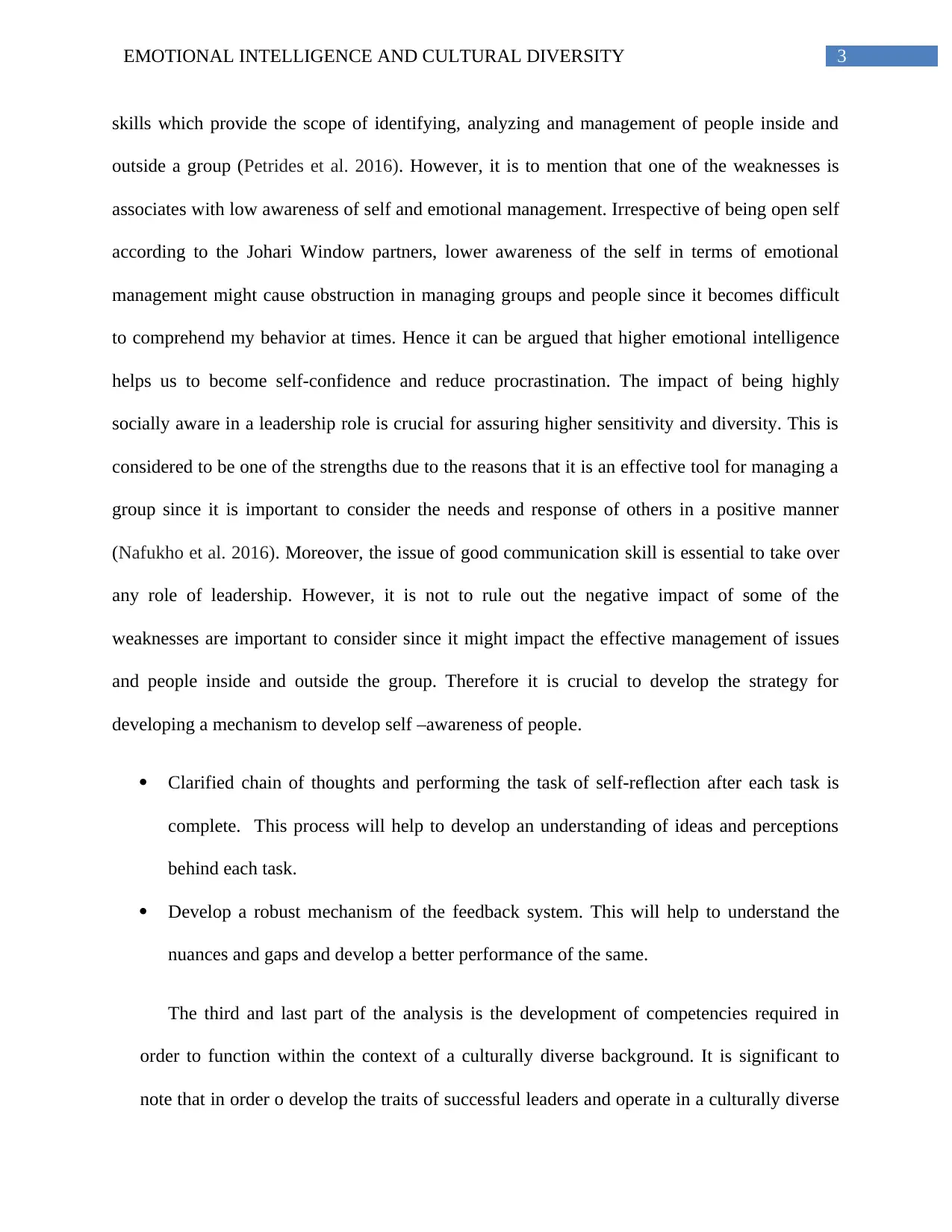
3EMOTIONAL INTELLIGENCE AND CULTURAL DIVERSITY
skills which provide the scope of identifying, analyzing and management of people inside and
outside a group (Petrides et al. 2016). However, it is to mention that one of the weaknesses is
associates with low awareness of self and emotional management. Irrespective of being open self
according to the Johari Window partners, lower awareness of the self in terms of emotional
management might cause obstruction in managing groups and people since it becomes difficult
to comprehend my behavior at times. Hence it can be argued that higher emotional intelligence
helps us to become self-confidence and reduce procrastination. The impact of being highly
socially aware in a leadership role is crucial for assuring higher sensitivity and diversity. This is
considered to be one of the strengths due to the reasons that it is an effective tool for managing a
group since it is important to consider the needs and response of others in a positive manner
(Nafukho et al. 2016). Moreover, the issue of good communication skill is essential to take over
any role of leadership. However, it is not to rule out the negative impact of some of the
weaknesses are important to consider since it might impact the effective management of issues
and people inside and outside the group. Therefore it is crucial to develop the strategy for
developing a mechanism to develop self –awareness of people.
Clarified chain of thoughts and performing the task of self-reflection after each task is
complete. This process will help to develop an understanding of ideas and perceptions
behind each task.
Develop a robust mechanism of the feedback system. This will help to understand the
nuances and gaps and develop a better performance of the same.
The third and last part of the analysis is the development of competencies required in
order to function within the context of a culturally diverse background. It is significant to
note that in order o develop the traits of successful leaders and operate in a culturally diverse
skills which provide the scope of identifying, analyzing and management of people inside and
outside a group (Petrides et al. 2016). However, it is to mention that one of the weaknesses is
associates with low awareness of self and emotional management. Irrespective of being open self
according to the Johari Window partners, lower awareness of the self in terms of emotional
management might cause obstruction in managing groups and people since it becomes difficult
to comprehend my behavior at times. Hence it can be argued that higher emotional intelligence
helps us to become self-confidence and reduce procrastination. The impact of being highly
socially aware in a leadership role is crucial for assuring higher sensitivity and diversity. This is
considered to be one of the strengths due to the reasons that it is an effective tool for managing a
group since it is important to consider the needs and response of others in a positive manner
(Nafukho et al. 2016). Moreover, the issue of good communication skill is essential to take over
any role of leadership. However, it is not to rule out the negative impact of some of the
weaknesses are important to consider since it might impact the effective management of issues
and people inside and outside the group. Therefore it is crucial to develop the strategy for
developing a mechanism to develop self –awareness of people.
Clarified chain of thoughts and performing the task of self-reflection after each task is
complete. This process will help to develop an understanding of ideas and perceptions
behind each task.
Develop a robust mechanism of the feedback system. This will help to understand the
nuances and gaps and develop a better performance of the same.
The third and last part of the analysis is the development of competencies required in
order to function within the context of a culturally diverse background. It is significant to
note that in order o develop the traits of successful leaders and operate in a culturally diverse
Paraphrase This Document
Need a fresh take? Get an instant paraphrase of this document with our AI Paraphraser
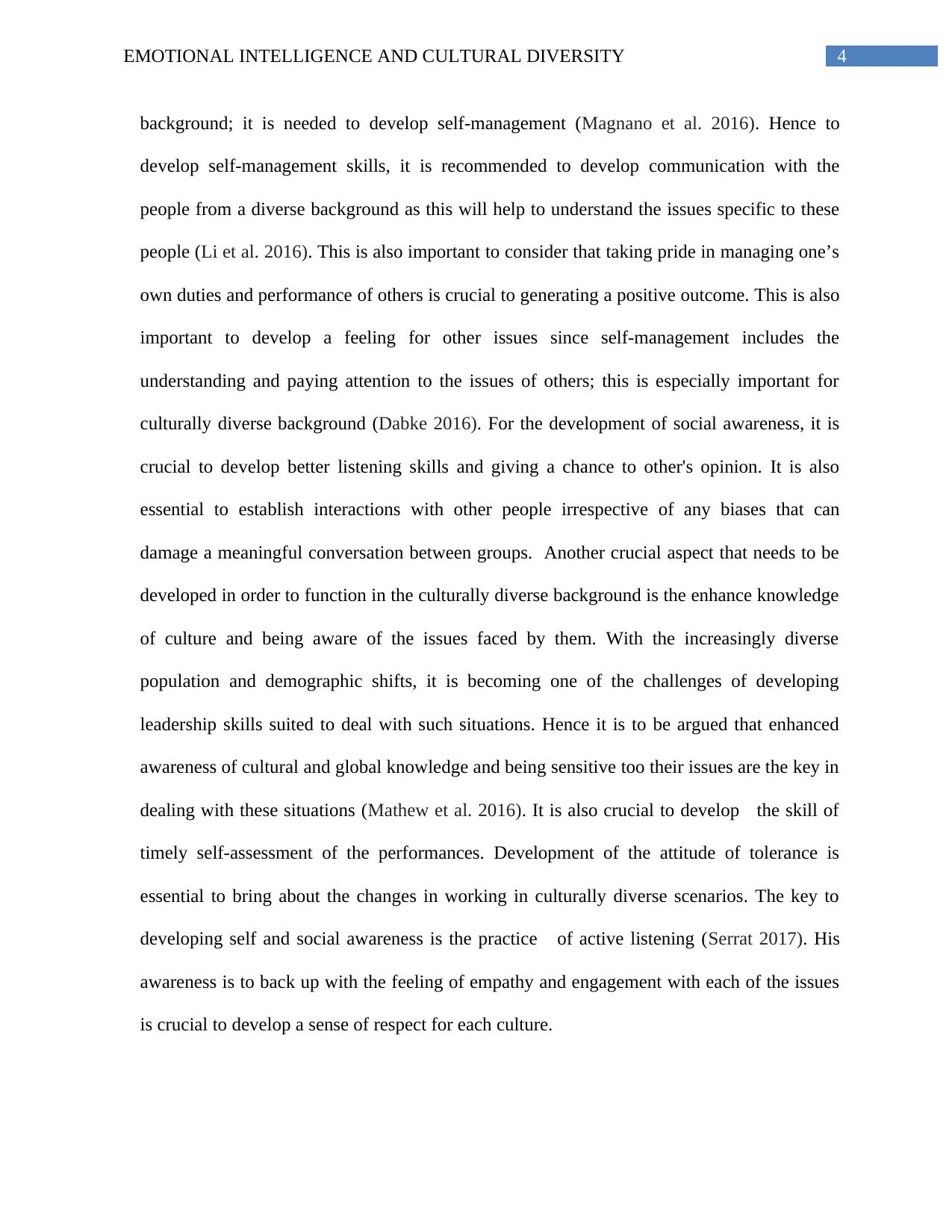
4EMOTIONAL INTELLIGENCE AND CULTURAL DIVERSITY
background; it is needed to develop self-management (Magnano et al. 2016). Hence to
develop self-management skills, it is recommended to develop communication with the
people from a diverse background as this will help to understand the issues specific to these
people (Li et al. 2016). This is also important to consider that taking pride in managing one’s
own duties and performance of others is crucial to generating a positive outcome. This is also
important to develop a feeling for other issues since self-management includes the
understanding and paying attention to the issues of others; this is especially important for
culturally diverse background (Dabke 2016). For the development of social awareness, it is
crucial to develop better listening skills and giving a chance to other's opinion. It is also
essential to establish interactions with other people irrespective of any biases that can
damage a meaningful conversation between groups. Another crucial aspect that needs to be
developed in order to function in the culturally diverse background is the enhance knowledge
of culture and being aware of the issues faced by them. With the increasingly diverse
population and demographic shifts, it is becoming one of the challenges of developing
leadership skills suited to deal with such situations. Hence it is to be argued that enhanced
awareness of cultural and global knowledge and being sensitive too their issues are the key in
dealing with these situations (Mathew et al. 2016). It is also crucial to develop the skill of
timely self-assessment of the performances. Development of the attitude of tolerance is
essential to bring about the changes in working in culturally diverse scenarios. The key to
developing self and social awareness is the practice of active listening (Serrat 2017). His
awareness is to back up with the feeling of empathy and engagement with each of the issues
is crucial to develop a sense of respect for each culture.
background; it is needed to develop self-management (Magnano et al. 2016). Hence to
develop self-management skills, it is recommended to develop communication with the
people from a diverse background as this will help to understand the issues specific to these
people (Li et al. 2016). This is also important to consider that taking pride in managing one’s
own duties and performance of others is crucial to generating a positive outcome. This is also
important to develop a feeling for other issues since self-management includes the
understanding and paying attention to the issues of others; this is especially important for
culturally diverse background (Dabke 2016). For the development of social awareness, it is
crucial to develop better listening skills and giving a chance to other's opinion. It is also
essential to establish interactions with other people irrespective of any biases that can
damage a meaningful conversation between groups. Another crucial aspect that needs to be
developed in order to function in the culturally diverse background is the enhance knowledge
of culture and being aware of the issues faced by them. With the increasingly diverse
population and demographic shifts, it is becoming one of the challenges of developing
leadership skills suited to deal with such situations. Hence it is to be argued that enhanced
awareness of cultural and global knowledge and being sensitive too their issues are the key in
dealing with these situations (Mathew et al. 2016). It is also crucial to develop the skill of
timely self-assessment of the performances. Development of the attitude of tolerance is
essential to bring about the changes in working in culturally diverse scenarios. The key to
developing self and social awareness is the practice of active listening (Serrat 2017). His
awareness is to back up with the feeling of empathy and engagement with each of the issues
is crucial to develop a sense of respect for each culture.
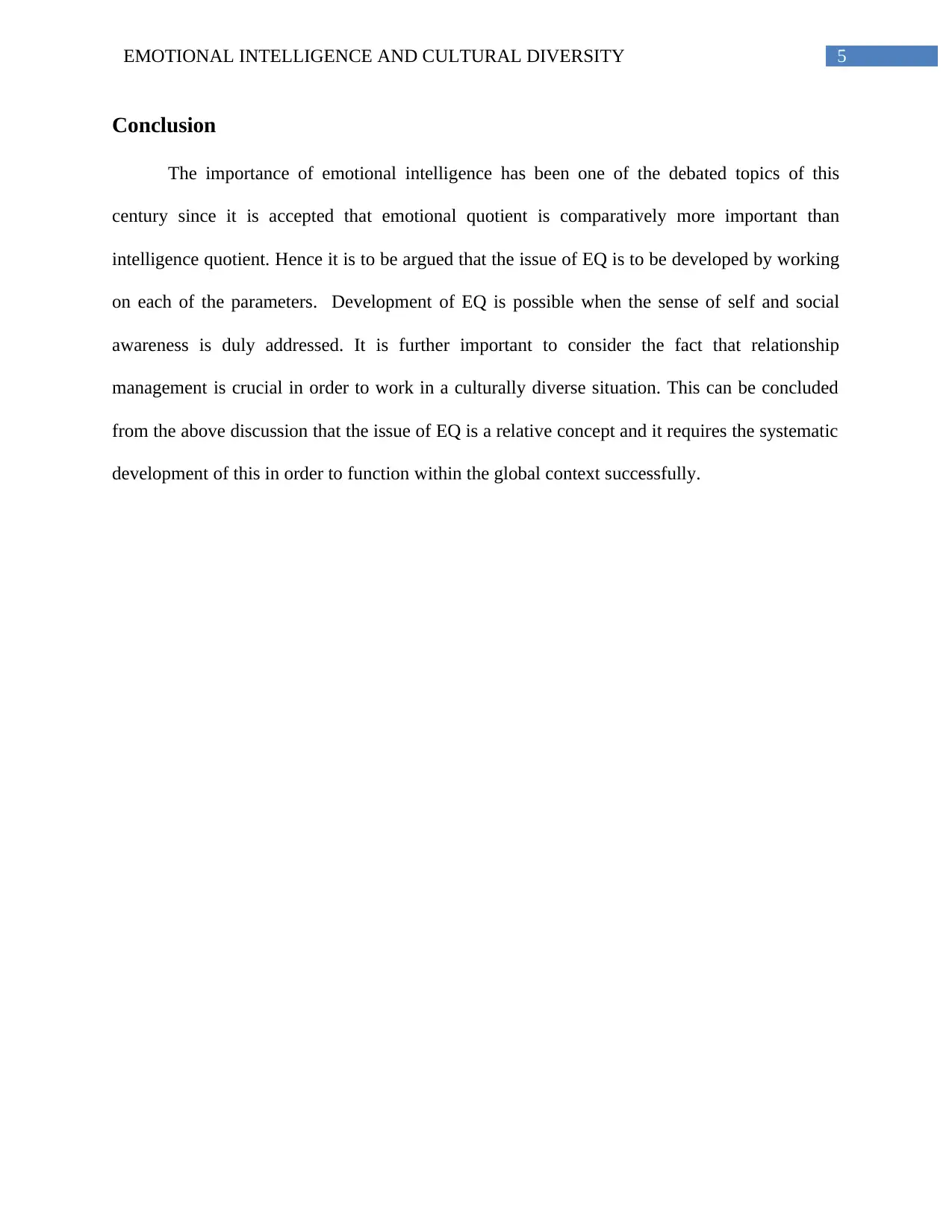
5EMOTIONAL INTELLIGENCE AND CULTURAL DIVERSITY
Conclusion
The importance of emotional intelligence has been one of the debated topics of this
century since it is accepted that emotional quotient is comparatively more important than
intelligence quotient. Hence it is to be argued that the issue of EQ is to be developed by working
on each of the parameters. Development of EQ is possible when the sense of self and social
awareness is duly addressed. It is further important to consider the fact that relationship
management is crucial in order to work in a culturally diverse situation. This can be concluded
from the above discussion that the issue of EQ is a relative concept and it requires the systematic
development of this in order to function within the global context successfully.
Conclusion
The importance of emotional intelligence has been one of the debated topics of this
century since it is accepted that emotional quotient is comparatively more important than
intelligence quotient. Hence it is to be argued that the issue of EQ is to be developed by working
on each of the parameters. Development of EQ is possible when the sense of self and social
awareness is duly addressed. It is further important to consider the fact that relationship
management is crucial in order to work in a culturally diverse situation. This can be concluded
from the above discussion that the issue of EQ is a relative concept and it requires the systematic
development of this in order to function within the global context successfully.
⊘ This is a preview!⊘
Do you want full access?
Subscribe today to unlock all pages.

Trusted by 1+ million students worldwide
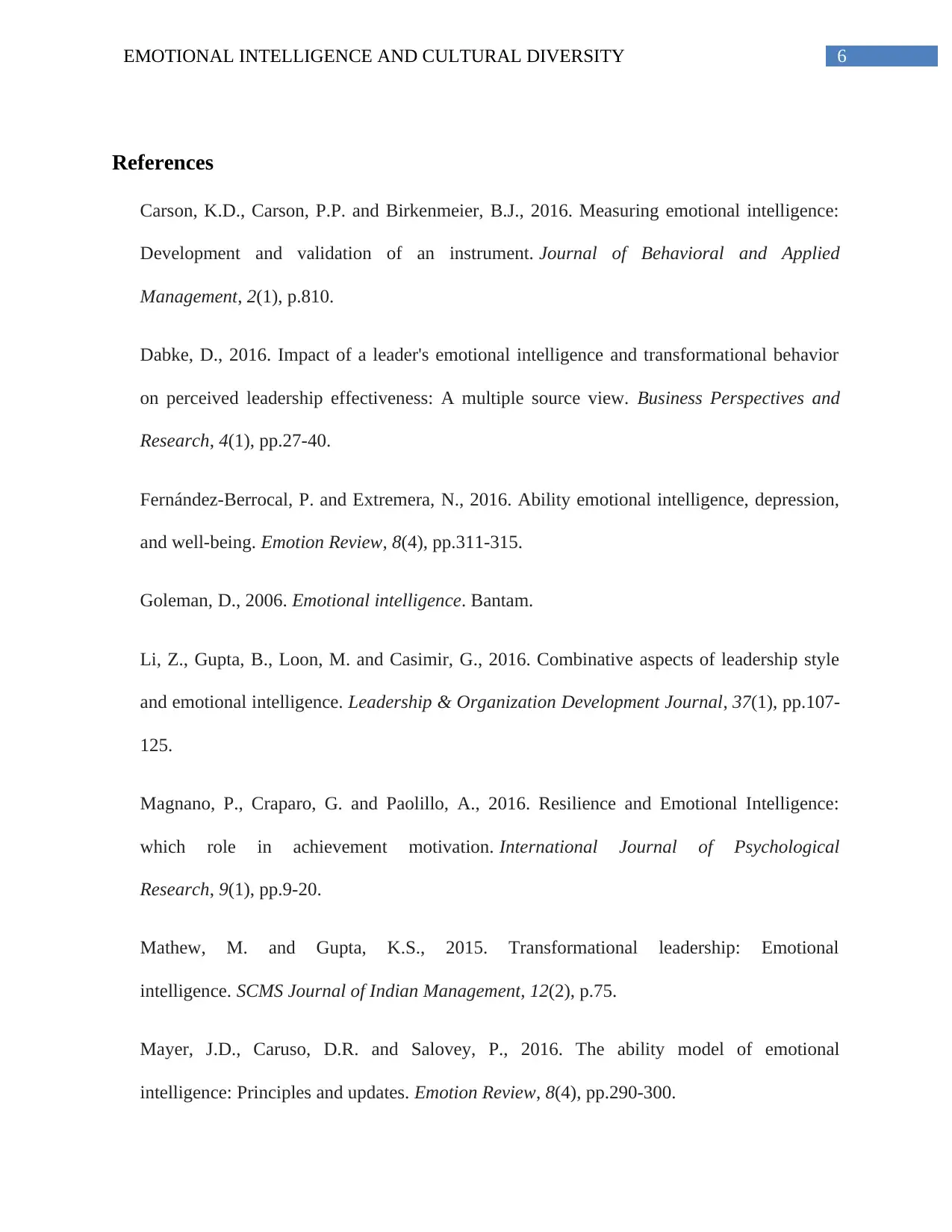
6EMOTIONAL INTELLIGENCE AND CULTURAL DIVERSITY
References
Carson, K.D., Carson, P.P. and Birkenmeier, B.J., 2016. Measuring emotional intelligence:
Development and validation of an instrument. Journal of Behavioral and Applied
Management, 2(1), p.810.
Dabke, D., 2016. Impact of a leader's emotional intelligence and transformational behavior
on perceived leadership effectiveness: A multiple source view. Business Perspectives and
Research, 4(1), pp.27-40.
Fernández-Berrocal, P. and Extremera, N., 2016. Ability emotional intelligence, depression,
and well-being. Emotion Review, 8(4), pp.311-315.
Goleman, D., 2006. Emotional intelligence. Bantam.
Li, Z., Gupta, B., Loon, M. and Casimir, G., 2016. Combinative aspects of leadership style
and emotional intelligence. Leadership & Organization Development Journal, 37(1), pp.107-
125.
Magnano, P., Craparo, G. and Paolillo, A., 2016. Resilience and Emotional Intelligence:
which role in achievement motivation. International Journal of Psychological
Research, 9(1), pp.9-20.
Mathew, M. and Gupta, K.S., 2015. Transformational leadership: Emotional
intelligence. SCMS Journal of Indian Management, 12(2), p.75.
Mayer, J.D., Caruso, D.R. and Salovey, P., 2016. The ability model of emotional
intelligence: Principles and updates. Emotion Review, 8(4), pp.290-300.
References
Carson, K.D., Carson, P.P. and Birkenmeier, B.J., 2016. Measuring emotional intelligence:
Development and validation of an instrument. Journal of Behavioral and Applied
Management, 2(1), p.810.
Dabke, D., 2016. Impact of a leader's emotional intelligence and transformational behavior
on perceived leadership effectiveness: A multiple source view. Business Perspectives and
Research, 4(1), pp.27-40.
Fernández-Berrocal, P. and Extremera, N., 2016. Ability emotional intelligence, depression,
and well-being. Emotion Review, 8(4), pp.311-315.
Goleman, D., 2006. Emotional intelligence. Bantam.
Li, Z., Gupta, B., Loon, M. and Casimir, G., 2016. Combinative aspects of leadership style
and emotional intelligence. Leadership & Organization Development Journal, 37(1), pp.107-
125.
Magnano, P., Craparo, G. and Paolillo, A., 2016. Resilience and Emotional Intelligence:
which role in achievement motivation. International Journal of Psychological
Research, 9(1), pp.9-20.
Mathew, M. and Gupta, K.S., 2015. Transformational leadership: Emotional
intelligence. SCMS Journal of Indian Management, 12(2), p.75.
Mayer, J.D., Caruso, D.R. and Salovey, P., 2016. The ability model of emotional
intelligence: Principles and updates. Emotion Review, 8(4), pp.290-300.
Paraphrase This Document
Need a fresh take? Get an instant paraphrase of this document with our AI Paraphraser
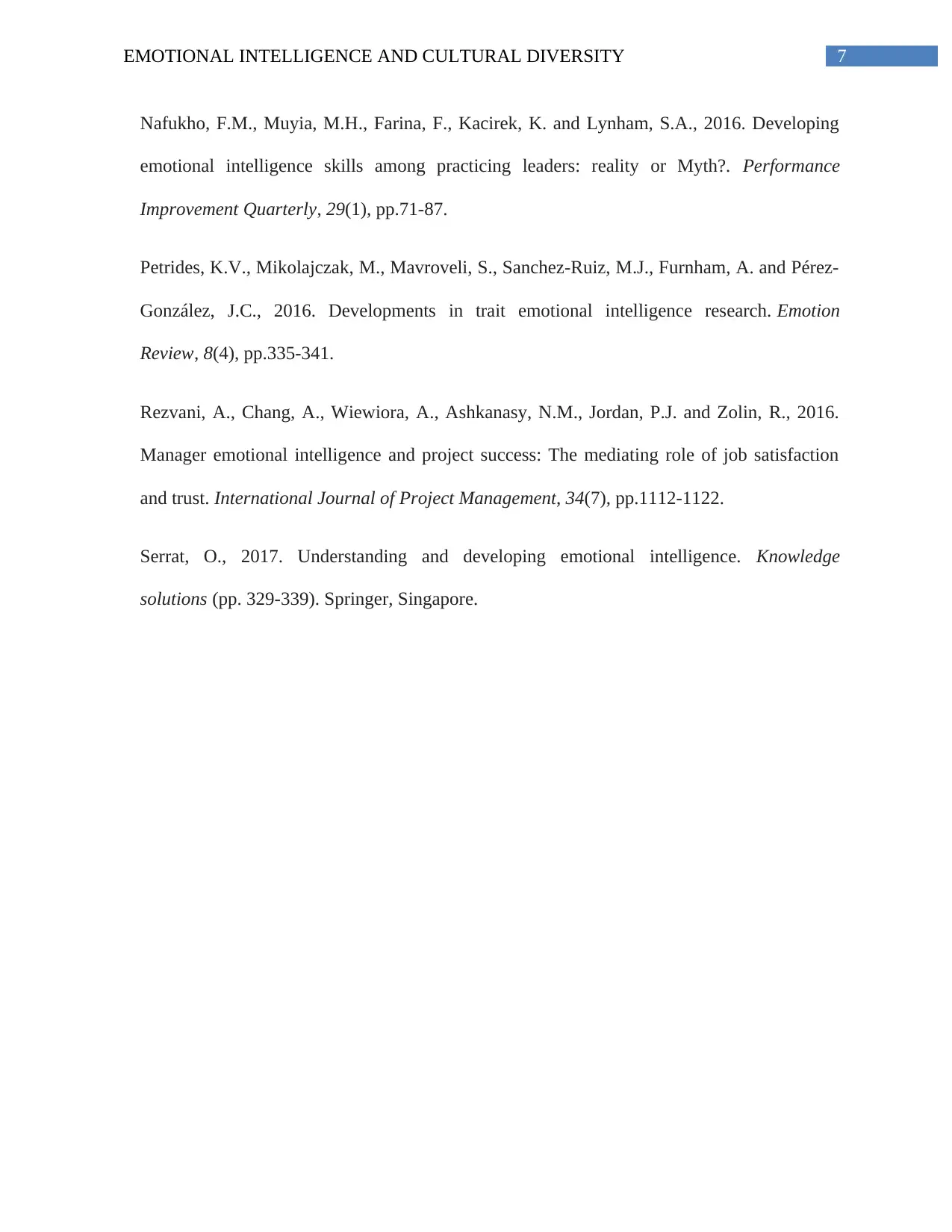
7EMOTIONAL INTELLIGENCE AND CULTURAL DIVERSITY
Nafukho, F.M., Muyia, M.H., Farina, F., Kacirek, K. and Lynham, S.A., 2016. Developing
emotional intelligence skills among practicing leaders: reality or Myth?. Performance
Improvement Quarterly, 29(1), pp.71-87.
Petrides, K.V., Mikolajczak, M., Mavroveli, S., Sanchez-Ruiz, M.J., Furnham, A. and Pérez-
González, J.C., 2016. Developments in trait emotional intelligence research. Emotion
Review, 8(4), pp.335-341.
Rezvani, A., Chang, A., Wiewiora, A., Ashkanasy, N.M., Jordan, P.J. and Zolin, R., 2016.
Manager emotional intelligence and project success: The mediating role of job satisfaction
and trust. International Journal of Project Management, 34(7), pp.1112-1122.
Serrat, O., 2017. Understanding and developing emotional intelligence. Knowledge
solutions (pp. 329-339). Springer, Singapore.
Nafukho, F.M., Muyia, M.H., Farina, F., Kacirek, K. and Lynham, S.A., 2016. Developing
emotional intelligence skills among practicing leaders: reality or Myth?. Performance
Improvement Quarterly, 29(1), pp.71-87.
Petrides, K.V., Mikolajczak, M., Mavroveli, S., Sanchez-Ruiz, M.J., Furnham, A. and Pérez-
González, J.C., 2016. Developments in trait emotional intelligence research. Emotion
Review, 8(4), pp.335-341.
Rezvani, A., Chang, A., Wiewiora, A., Ashkanasy, N.M., Jordan, P.J. and Zolin, R., 2016.
Manager emotional intelligence and project success: The mediating role of job satisfaction
and trust. International Journal of Project Management, 34(7), pp.1112-1122.
Serrat, O., 2017. Understanding and developing emotional intelligence. Knowledge
solutions (pp. 329-339). Springer, Singapore.
1 out of 8
Related Documents
Your All-in-One AI-Powered Toolkit for Academic Success.
+13062052269
info@desklib.com
Available 24*7 on WhatsApp / Email
![[object Object]](/_next/static/media/star-bottom.7253800d.svg)
Unlock your academic potential
Copyright © 2020–2026 A2Z Services. All Rights Reserved. Developed and managed by ZUCOL.





